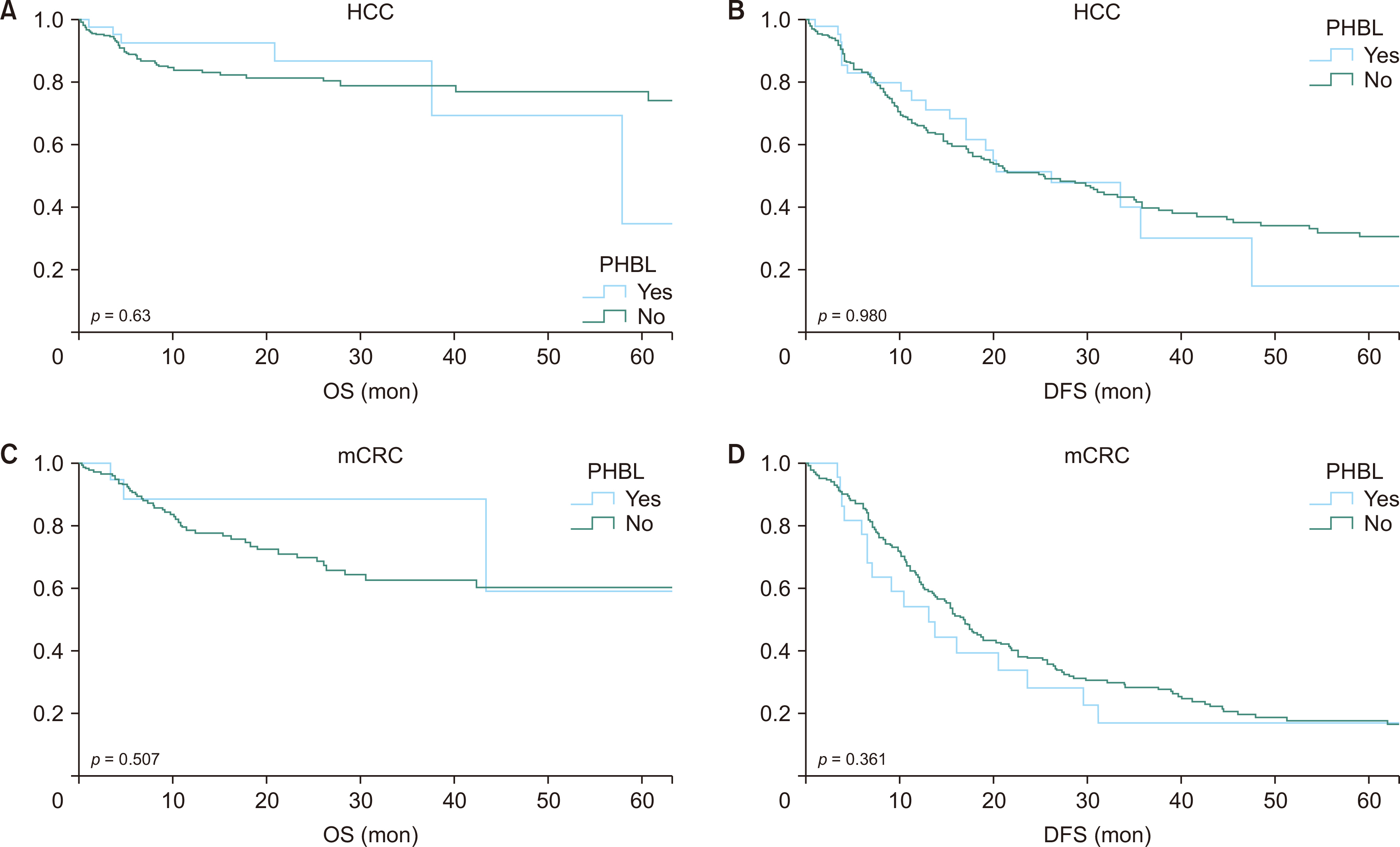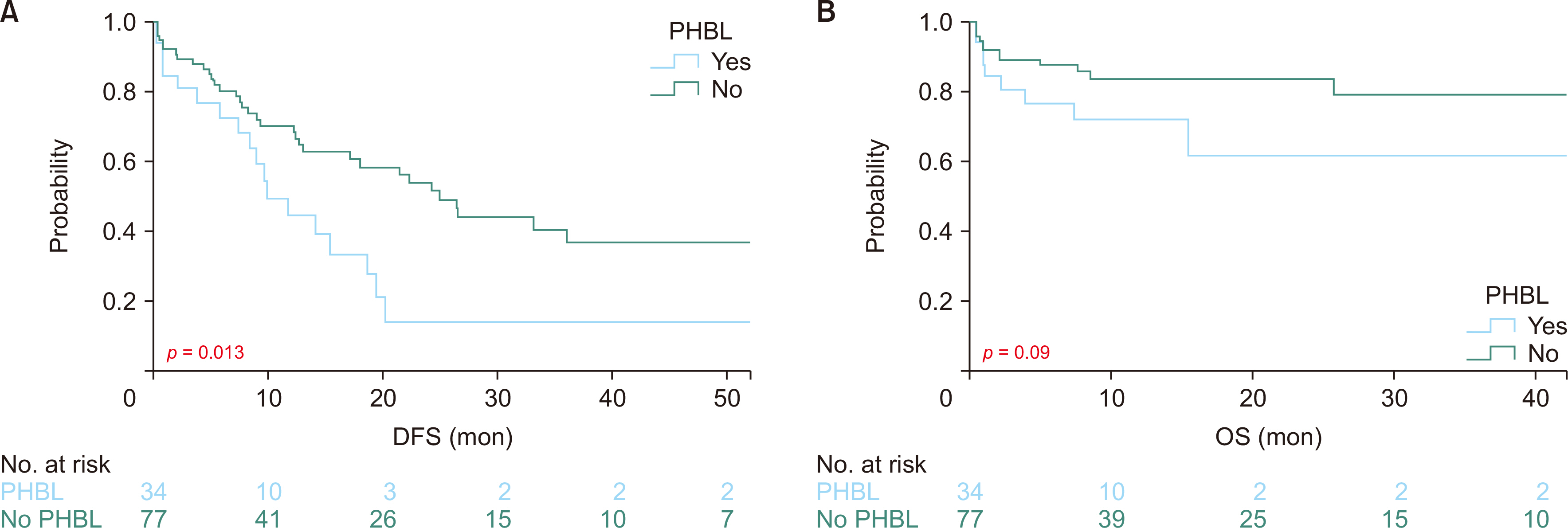Ann Hepatobiliary Pancreat Surg.
2024 Nov;28(4):451-457. 10.14701/ahbps.24-078.
Impact of post-hepatectomy biliary leaks on long-term survival in different liver tumors: A single institute experience
- Affiliations
-
- 1Division of Colon and Rectal Surgery, Advocate Lutheran General Hospital, Park Ridge, IL, USA
- 2Department of Surgical Oncology, GI and HPB Services, Tata Memorial Hospital, Homi Bhabha National Institute, Mumbai, India
- 3Department of Digestive Diseases and Clinical Nutrition, Tata Memorial Hospital, Homi Bhabha National Institute, Mumbai, India
- 4Department of Radiodiagnosis, Tata Memorial Hospital, Homi Bhabha National Institute, Mumbai, India
- KMID: 2561577
- DOI: http://doi.org/10.14701/ahbps.24-078
Abstract
- Backgrounds/Aims
A postoperative biliary leak is one of the most morbid complications occurring after a liver resection, the longterm impact of which remains unknown.
Methods
Retrospective analysis of consecutive liver resections performed from 1 January 2011 to 31 December 2021. Primary endpoint of disease-free survival (DFS) was compared between patients with and without a bile leak, stratifying for tumor type. Survival curves were plotted using Kaplan–Meier estimates, and differences between them were analyzed using the log–rank test.
Results
In toto, 862 patients were analyzed, and included 306 (35.5%) hepatocellular carcinomas, 212 (24.6%) metastatic colorectal cancers, and 111 (12.9%) cholangiocarcinomas (69 intrahepatic cholangiocarcinomas, 42 hilar cholangiocarcinomas). Occurrence of a bile leak was associated with significantly poorer DFS only in patients with cholangiocarcinoma (median DFS 9.9 months vs. 24.9 months, p = 0.013), and further analysis was restricted to this cohort. A Cox regression performed for factors associated with DFS detriment in patients with cholangiocarcinoma showed that apart from node positivity (hazard ratio [HR]: 2.482, p = 0.033) and margin positivity (HR: 2.65, p = 0.021), development of a bile leak was independently associated with worsening DFS on both univariate and multiple regression analyses (HR: 1.896, p = 0.033).
Conclusions
Post-hepatectomy biliary leaks are associated with significantly poorer DFS only in patients with cholangiocarcinoma, but not in patients with hepatocellular carcinoma or metastatic colorectal cancer. Methods to mitigate this survival detriment need to be explored.
Figure
Reference
-
References
1. Cauchy F, Fuks D, Nomi T, Schwarz L, Belgaumkar A, Scatton O, et al. 2016; Incidence, risk factors and consequences of bile leakage following laparoscopic major hepatectomy. Surg Endosc. 30:3709–3719. DOI: 10.1007/s00464-015-4666-z. PMID: 26578433.2. Guillaud A, Pery C, Campillo B, Lourdais A, Sulpice L, Boudjema K. 2013; Incidence and predictive factors of clinically relevant bile leakage in the modern era of liver resections. HPB (Oxford). 15:224–229. DOI: 10.1111/j.1477-2574.2012.00580.x. PMID: 23374363. PMCID: PMC3572284.3. Tanaka S, Hirohashi K, Tanaka H, Shuto T, Lee SH, Kubo S, et al. 2002; Incidence and management of bile leakage after hepatic resection for malignant hepatic tumors. J Am Coll Surg. 195:484–489. DOI: 10.1016/S1072-7515(02)01288-7. PMID: 12375753.4. Wang J, Zhao JP, Wang JJ, Chai SS, Zhang YX, Zhang ZG, et al. 2020; The impact of bile leakage on long-term prognosis in primary liver cancers after hepatectomy: a propensity-score-matched study. Asian J Surg. 43:603–612. DOI: 10.1016/j.asjsur.2019.08.009. PMID: 31611103.5. Ito H, Are C, Gonen M, D'Angelica M, Dematteo RP, Kemeny NE, et al. 2008; Effect of postoperative morbidity on long-term survival after hepatic resection for metastatic colorectal cancer. Ann Surg. 247:994–1002. DOI: 10.1097/SLA.0b013e31816c405f. PMID: 18520227.6. Bismuth H, Chiche L. 1993; Surgery of hepatic tumors. Prog Liver Dis. 11:269–285.7. Koch M, Garden OJ, Padbury R, Rahbari NN, Adam R, Capussotti L, et al. 2011; Bile leakage after hepatobiliary and pancreatic surgery: a definition and grading of severity by the International Study Group of Liver Surgery. Surgery. 149:680–688. DOI: 10.1016/j.surg.2010.12.002. PMID: 21316725.8. Patkar S, Kunte A, Sundaram S, Goel M. 2023; Post-hepatectomy biliary leaks: analysis of risk factors and development of a simplified predictive scoring system. Langenbecks Arch Surg. 408:63. DOI: 10.1007/s00423-023-02776-w. PMID: 36692605.9. Parsons M, Lloyd S, Johnson S, Scaife C, Soares H, Kim R, et al. 2023; The implications of treatment delays in adjuvant therapy for resected cholangiocarcinoma patients. J Gastrointest Cancer. 54:492–500. DOI: 10.1007/s12029-022-00820-4. PMID: 35445343. PMCID: PMC9020757.10. Wang H, Lafdil F, Kong X, Gao B. 2011; Signal transducer and activator of transcription 3 in liver diseases: a novel therapeutic target. Int J Biol Sci. 7:536–550. DOI: 10.7150/ijbs.7.536. PMID: 21552420. PMCID: PMC3088876.11. Rizk NP, Bach PB, Schrag D, Bains MS, Turnbull AD, Karpeh M, et al. 2004; The impact of complications on outcomes after resection for esophageal and gastroesophageal junction carcinoma. J Am Coll Surg. 198:42–50. DOI: 10.1016/j.jamcollsurg.2003.08.007. PMID: 14698310.12. Mohkam K, Fuks D, Vibert E, Nomi T, Cauchy F, Kawaguchi Y, et al. 2018; External validation and optimization of the French Association of Hepatopancreatobiliary Surgery and Transplantation's score to predict severe postoperative biliary leakage after open or laparoscopic liver resection. J Am Coll Surg. 226:1137–1146. DOI: 10.1016/j.jamcollsurg.2018.03.024. PMID: 29574179.13. Shehta A, Farouk A, Said R, Nakeeb AE, Aboelenin A, Elshobary M, et al. 2022; Bile leakage after hepatic resection for hepatocellular carcinoma: does it impact the short- and long-term outcomes? J Gastrointest Surg. 26:2070–2081. DOI: 10.1007/s11605-022-05433-7. PMID: 36002785. PMCID: PMC9568438.14. Braunwarth E, Primavesi F, Göbel G, Cardini B, Oberhuber R, Margreiter C, et al. 2019; Is bile leakage after hepatic resection associated with impaired long-term survival? Eur J Surg Oncol. 45:1077–1083. DOI: 10.1016/j.ejso.2019.02.021. PMID: 30803908.15. Agarwal V, Divatia JV. 2019; Enhanced recovery after surgery in liver resection: current concepts and controversies. Korean J Anesthesiol. 72:119–129. DOI: 10.4097/kja.d.19.00010. PMID: 30841029. PMCID: PMC6458514.
- Full Text Links
- Actions
-
Cited
- CITED
-
- Close
- Share
- Similar articles
-
- Complication of donor right hepatectomy for living donor right hepatectomy: a single Mongolian center experience
- Laparoscopic hepatectomy versus open hepatectomy for hepatocellular carcinoma: A propensity case-matched analysis of the long-term survival
- Effect of neoadjuvant transarterial chemoembolization followed by resection versus upfront liver resection on the survival of single large hepatocellular carcinoma patients: A systematic review and meta-analysis
- Clinical significance of post-hepatectomy hepatic failure in patients with liver metastases from colorectal cancer
- Fifteen-year-long journey with hepatocellular carcinoma from diagnosis during pregnancy to recurrence after liver transplantation: A case report of intractable tumor recurrence



